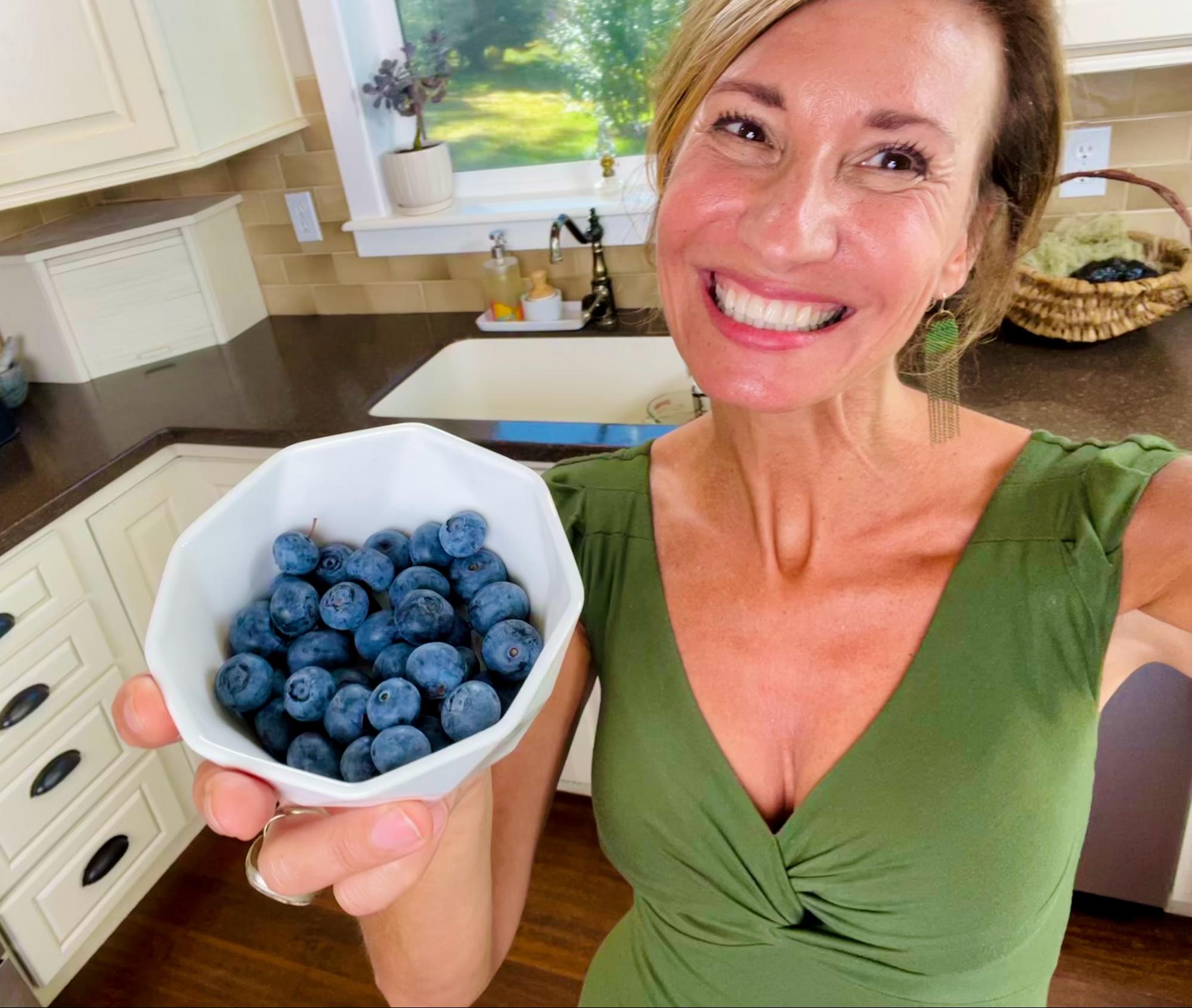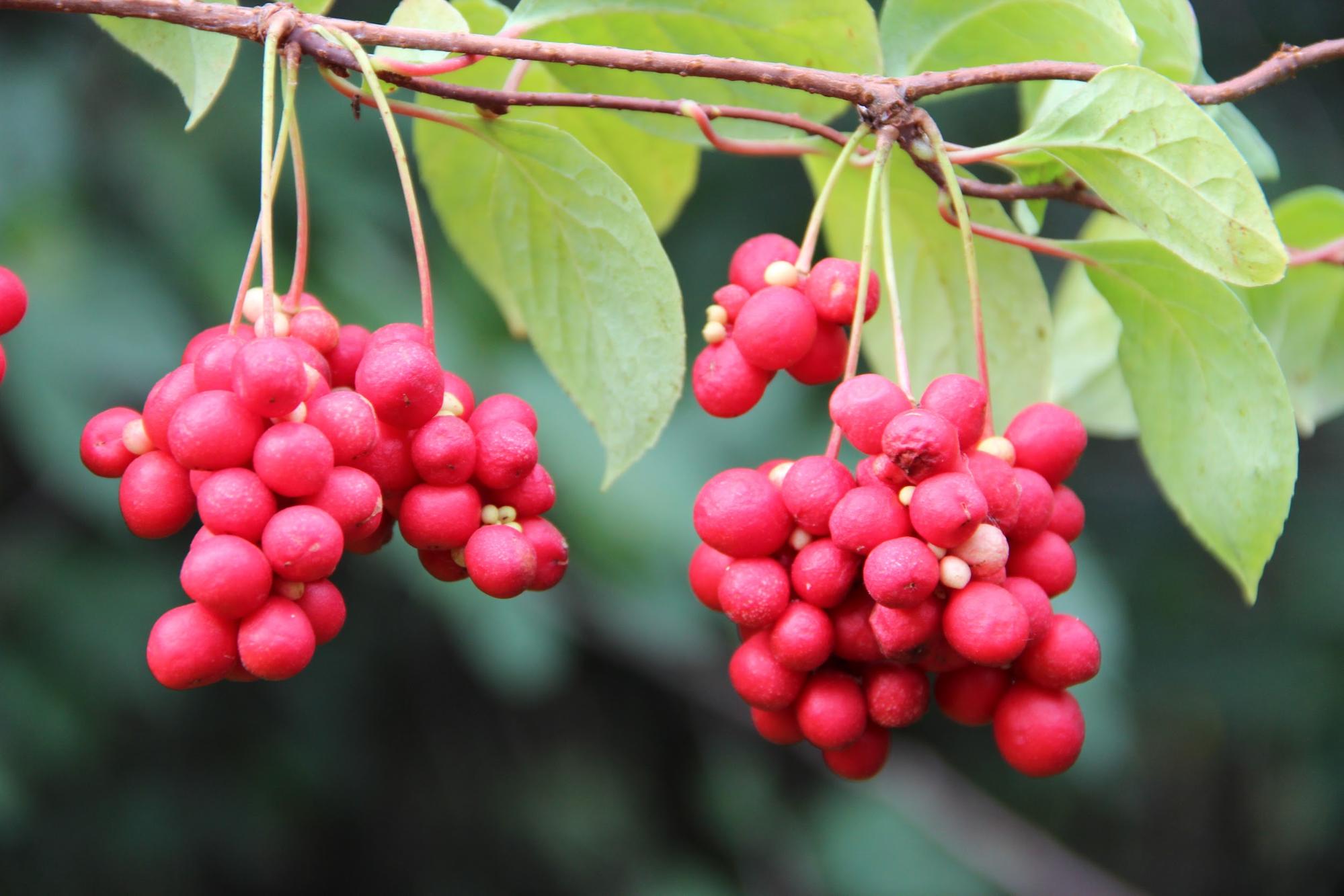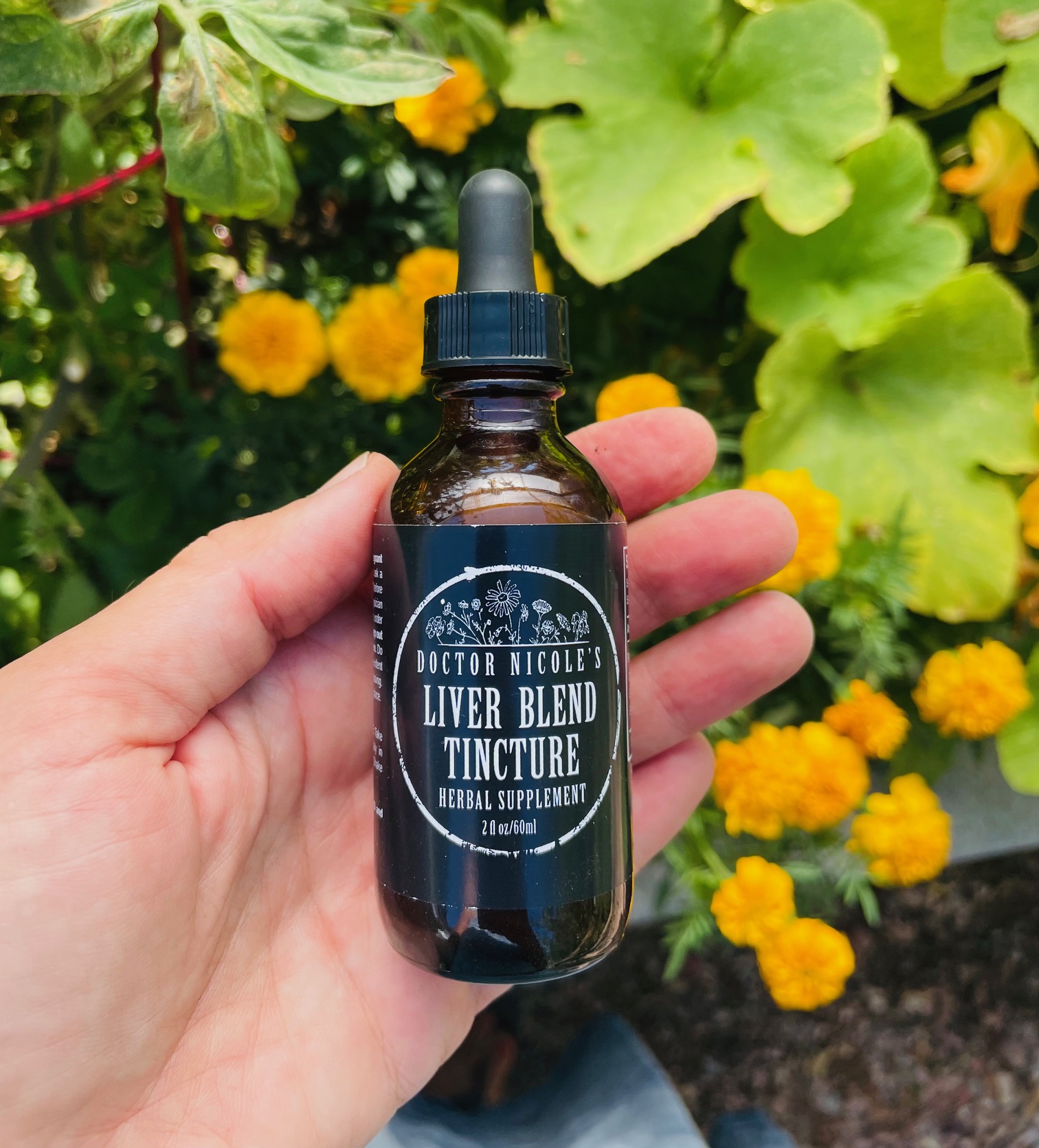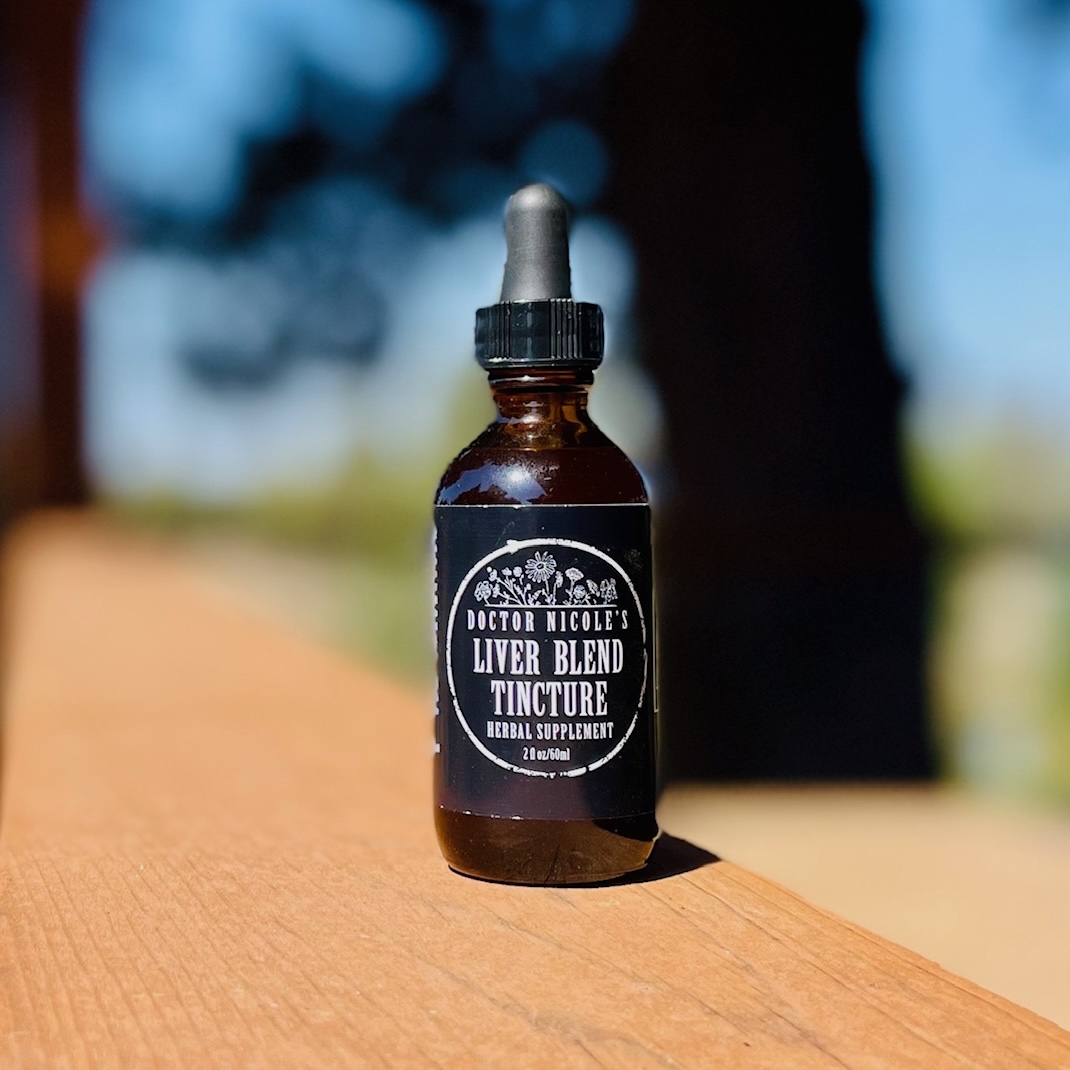A Hard-Working Organ
Your liver is an industrious organ integral to detoxification, bile production for digesting fats and absorbing nutrients, and energy storage. Because of this, it is important to treat this undervalued workhorse well! In our modern age, it is not uncommon for the liver to become burdened and stressed by environmental toxins, overuse of alcoholic beverages, infections such as hepatitis A, B, and C, and excessive fat. In this post, we will discuss the top foods and herbs that will help you to love and support your liver for optimal health. Let’s begin!

Essential Foods for a Happy Liver
Blueberries and cranberries. Both of these berries contain important antioxidants called anthocyanins. These are the compounds that give the berries their deep color. A 2021 study found that taking a cranberry supplement for six months can help to improve liver health in those with non-alcoholic fatty liver disease (NAFLD), lipid profiles, and insulin resistance compared to those given a placebo.1 Moreover, blueberry extract has been shown to inhibit the growth of human liver cancer cells in test-tube studies.6
Tea and coffee. Yes, you read that right! Your morning cup of coffee or tea can help keep your liver healthy. One study found that those with chronic liver disease had a reduced risk of permanent liver damage if they drank coffee.2 Other research has established that green tea consumption helped to lower the risk of liver cancer and also reduced elevated liver enzymes in those with NAFLD.3,4
Cruciferous vegetables. If you need another reason to eat your broccoli, kale, cauliflower, or Brussels sprouts, research has found that plant compounds found in these vegetables help to support natural detoxification, thereby reducing stress on the liver.5
Nuts and seeds. Good news! If you love nuts, studies have shown that diets high in this crunchy food are protective against the development of NAFLD.7 What’s more, nuts are rich in protein, vitamin D, calcium, fiber, and health-promoting fats, all of which support the smooth functioning of your liver.
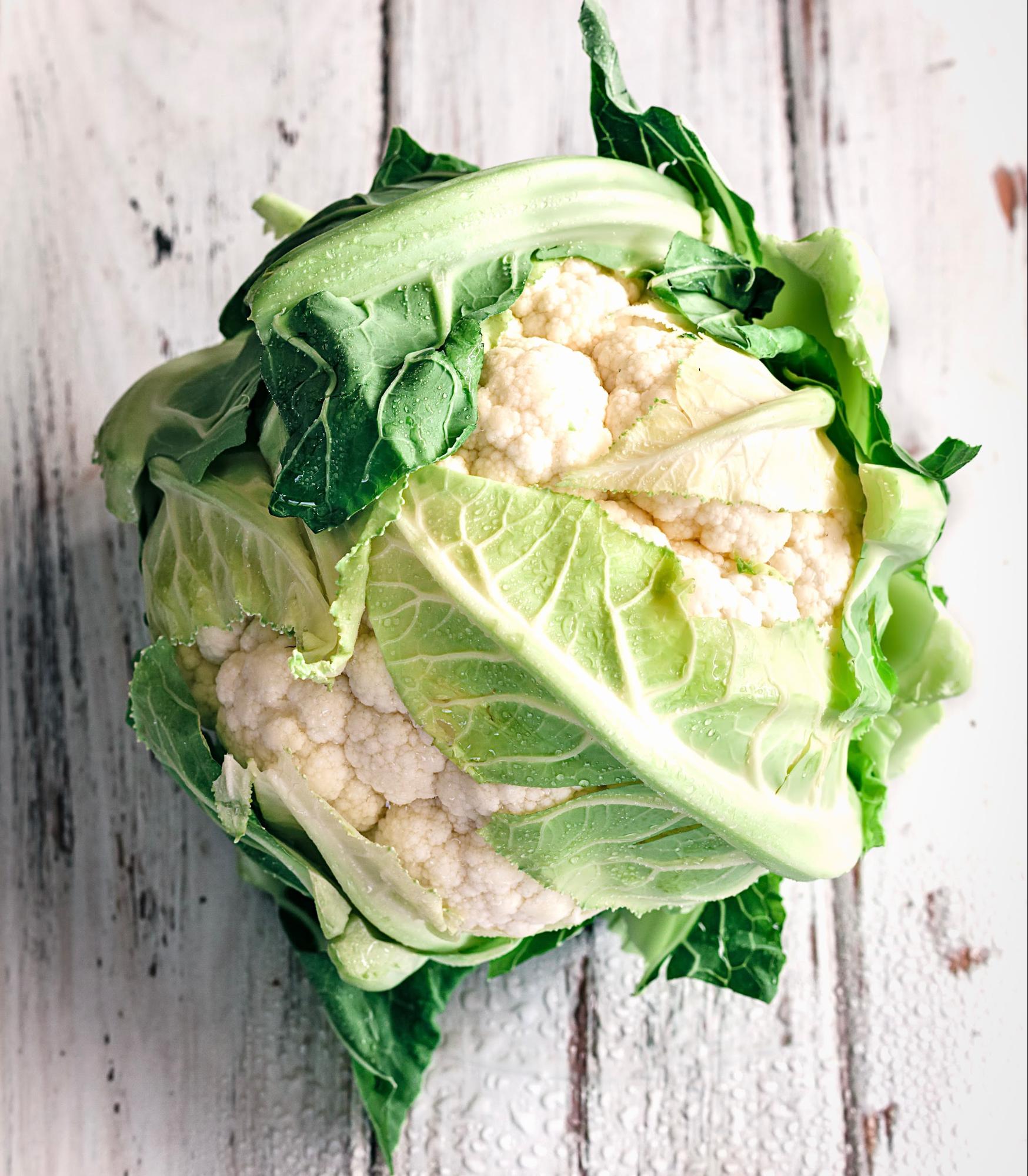
Fatty fish. Interestingly, studies have found that those who consume fatty fish rich in omega-3 fats have lower inflammation and reduced liver fat in people with NAFLD.8 It’s important to note that you want to eat a diet rich in these anti-inflammatory fats and reduce your consumption of omega-6 fats from plant oils and butter for optimal liver health.
Olive oil. A 2018 study established that extra virgin olive oil has a protective effect on the liver due to monounsaturated fatty acids, particularly oleic acid and phenolic compounds.9 The team believes these fatty acids activate a spectrum of signaling pathways involved in “the prevention of inflammation, oxidative stress, endoplasmic reticulum stress, mitochondrial dysfunction, and insulin resistance, allowing the prevention or resolution of liver damage.”
Likewise, subsequent studies have found the consumption of olive oil helps to curb fat accumulation in the liver and improves blood liver enzyme levels.10
Plant-Powered Health Solutions
Along with the above foods, I also recommend herbal remedies for healing your liver and supporting healthy functioning. Our Liver Blend combines health-boosting dandelion root, milk thistle, and Schisandra berry to help detoxify pharmaceutical and environmental toxins. It also addresses liver concerns like cirrhosis and fatty liver, while cooling inflammation and supporting healthy regeneration.
Dandelion Root (Taraxacum officinale)
- Diuretic
- Blood purifier
- Lowers liver inflammation
- Flushes toxins from the liver
- Reduces lipid accumulation in the liver
- Detoxifies the liver, gallbladder, and kidneys11,12
Milk Thistle Seed (Silybum marianum)
Helps with the following conditions:
- Cirrhosis
- Fatty liver disease
- Jaundice
- Hepatitis
Milk thistle also:
Clears the liver of environmental toxins, including: poisons, drugs, and chemotherapy agents13
Exhibits antioxidant, lipid-lowering, antihypertensive, antidiabetic, antiatherosclerotic, and anti-obesity effects due to the bioactive compound silymarin.14
Schisandra Berries (Schisandra chinensis)
- Promotes liver regeneration15
- Addresses non-alcoholic fatty liver disease (NAFLD)16
- Antiviral, anti-inflammatory, anti-cancer, anti-aging17
- Helpful for kidney, neurological, gastrointestinal, and liver disorders18
If you are seeking an all-in-one herbal formulation that encourages healthy liver function and detoxification, this concentrated extract is for you! Visit my apothecary today to learn more.
Nicole Apelian
Nicole’s Apothecary Products in this Post
References
- Masnadi Shirazi K, Shirinpour E, Masnadi Shirazi A, Nikniaz Z. Effect of cranberry supplementation on liver enzymes and cardiometabolic risk factors in patients with NAFLD: A randomized clinical trial. BMC Complement Med Ther. 2021;21(1):283. doi:10.1186/s12906-021-03436-6
- Kennedy OJ, Roderick P, Buchanan R, Fallowfield JA, Hayes PC, Parkes J. Systematic review with meta-analysis: Coffee consumption and the risk of cirrhosis. Aliment Pharmacol Ther. 2016;43(5):562-574. doi:10.1111/apt.13523
- Ni CX, Gong H, Liu Y, Qi Y, Jiang CL, Zhang JP. Green tea consumption and the risk of liver cancer: a meta-analysis. Nutr Cancer. 2017;69(2):211-220. doi:10.1080/01635581.2017.1263754
- Mahmoodi M, Hosseini R, Kazemi A, Ofori-Asenso R, Mazidi M, Mazloomi SM. Effects of green tea or green tea catechin on liver enzymes in healthy individuals and people with nonalcoholic fatty liver disease: A systematic review and meta-analysis of randomized clinical trials. Phytother Res. 2020;34(7):1587-1598. doi:10.1002/ptr.6637
- Hodges RE, Minich DM. Modulation of metabolic detoxification pathways using foods and food-derived components: A scientific review with clinical application. J Nutr Metab. 2015;2015:760689. doi:10.1155/2015/760689
- Huailing Wang, Xinbo Guo, Xiaodan Hu, Tong Li, Xiong Fu, Rui Hai Liu, Comparison of phytochemical profiles, antioxidant and cellular antioxidant activities of different varieties of blueberry (Vaccinium spp.), Food Chemistry, Volume 217, 2017, Pages 773-781. https://doi.org/10.1016/j.foodchem.2016.09.002.
- Chen BB, Han Y, Pan X, et al. Association between nut intake and non-alcoholic fatty liver disease risk: A retrospective case-control study in a sample of Chinese Han adults. BMJ Open. 2019;9(9):e028961. doi:10.1136/bmjopen-2019-028961
- Lu W, Li S, Li J, et al. Effects of omega-3 fatty acid in nonalcoholic fatty liver disease: A meta-analysis. Gastroenterol Res Pract. 2016;2016:1459790. doi:10.1155/2016/1459790
- Soto-Alarcon, S. A., Valenzuela, R., Valenzuela, A., & Videla, L. A. (2018). Liver Protective Effects of Extra Virgin Olive Oil: Interaction between Its Chemical Composition and the Cell-signaling Pathways Involved in Protection. Endocrine, metabolic & immune disorders drug targets, 18(1), 75–84. https://doi.org/10.2174/1871530317666171114120552
- Gosal H, Kaur H, Chakwop Ngassa H, Elmenawi KA, Anil V, Mohammed L. The Significance of the Mediterranean Diet in the Management of Non-Alcoholic Fatty Liver Disease: A Systematic Review. Cureus. 2021 Jun 13;13(6):e15618. doi: 10.7759/cureus.15618. PMID: 34277236; PMCID: PMC8275052.
- Mohaddese, Mahboubi & Mahboubi, Mona. (2020). Hepatoprotection by dandelion ( Taraxacum officinale ) and mechanisms. Asian Pacific Journal of Tropical Biomedicine. 10. 1. 10.4103/2221-1691.273081.
- Hamza, A.A., Mohamed, M.G., Lashin, F.M. et al. Dandelion prevents liver fibrosis, inflammatory response, and oxidative stress in rats. JoBAZ 81, 43 (2020). https://doi.org/10.1186/s41936-020-00177-9
- Hackett, E. S., Twedt, D. C., & Gustafson, D. L. (2013). Milk thistle and its derivative compounds: a review of opportunities for treatment of liver disease. Journal of veterinary internal medicine, 27(1), 10–16. https://doi.org/10.1111/jvim.12002
- Tajmohammadi, A., Razavi, B. M., & Hosseinzadeh, H. (2018). Silybum marianum (milk thistle) and its main constituent, silymarin, as a potential therapeutic plant in metabolic syndrome: A review. Phytotherapy research : PTR, 32(10), 1933–1949. https://doi.org/10.1002/ptr.6153
- Li, X., Fan, X., Li, D., Zeng, X., Zeng, H., Wang, Y., Zhou, Y., Chen, Y., Huang, M., & Bi, H. (2016). Schisandra sphenanthera Extract Facilitates Liver Regeneration after Partial Hepatectomy in Mice. Drug metabolism and disposition: the biological fate of chemicals, 44(5), 647–652. https://doi.org/10.1124/dmd.115.068288
- Leong, P. K., & Ko, K. M. (2016). Schisandrin B: A Double-Edged Sword in Nonalcoholic Fatty Liver Disease. Oxidative medicine and cellular longevity, 2016, 6171658. https://doi.org/10.1155/2016/6171658
- Kopustinskiene, D. M., & Bernatoniene, J. (2021). Antioxidant Effects of Schisandra chinensis Fruits and Their Active Constituents. Antioxidants (Basel, Switzerland), 10(4), 620. https://doi.org/10.3390/antiox10040620
- Zhang, F., Zhai, J., Weng, N., Gao, J., Yin, J., & Chen, W. (2022). A Comprehensive Review of the Main Lignan Components of Schisandra chinensis (North Wu Wei Zi) and Schisandra sphenanthera (South Wu Wei Zi) and the Lignan-Induced Drug-Drug Interactions Based on the Inhibition of Cytochrome P450 and P-Glycoprotein Activities. Frontiers in pharmacology, 13, 816036. https://doi.org/10.3389/fphar.2022.816036

